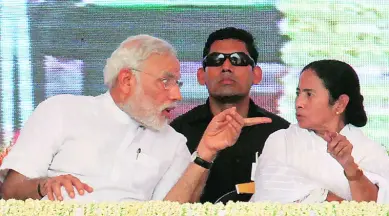Bangladesh supremo Sheikh Hasina recently concluded her four-day long official visit to India, which is touted as the most major visit by any of India’s neighbouring countries in recent history. Bangladesh and India have shared a delicate relationship, of which West Bengal’s Chief Ministers were a critical part.
However, this time round, the exclusion of Mamata Banerjee from the national-level political talks regarding Bangladesh is eye-raising.
Even back in 2011, Mamata Banerjee’s refusal to share the Teesta river water with Bangladesh led to a scuttle in India-Bangladesh relations. However, despite this, she was included in all high-level bilateral talks with Bangladesh. She herself continued to enjoy a great diplomatic relationship with Sheikh Hasina.
The Centre’s decision to not summon her for the talks with Bangladesh has openly irked the Trinamool Congress workers and the supremo Mamata Banerjee herself.
A senior TMC leader spoke to The Indian Express on condition of anonymity and claimed that this instance, coupled with the previous instances of Mamata Banerjee not being allowed to travel abroad, simply shows the deep anxiety of the BJP regarding Mamata’s stature. It illustrates how the Centre “does not want Mamata Banerjee to play a bigger role in national politics” and have “good ties with foreign countries.”
To this, senior BJP spokesperson Samik Bhattacharjee responded by saying, “This was an official visit by Bangladesh’s Prime Minister to India. On such official visits, no state chief minister is called to attend. There may be exceptions when such visits take place in a particular state, but when the event is being held in the National Capital, why would the Chief Minister be invited? Mamata Banerjee is playing politics on the issue.”
However, Mamata Banerjee has pointed out that this was the first time that a West Bengal Chief Minister has been kept out of the bilateral discussions and events with Bangladesh.
Tearing into Narendra Modi’s government, she said, “I share an excellent relationship with her (Hasina), but the centre did not invite me to be a part of her visit. I don’t want to talk about external affairs or bilateral ties. But I have noticed that the centre tries to stop me whenever I am invited to foreign countries. I have even read that Sheikh Hasina expressed a desire to meet me. For the first time, West Bengal has been kept out of discussions with Bangladesh.”
In 2015, Prime Minister Narendra Modi invited Mamata Banerjee to Bangladesh, where a ceremonial event to flag off the bus service between the two countries was held.
Then, in 2018, Modi, Banerjee, and Hasina shared the stage at the convocation ceremony of Visva Bharati University in the Birbhum district of Bolpur town.
A year later, the Bangladesh Prime Minister and Banerjee held a brief one-on-one meeting on the sidelines of the historic pink ball Test match between India and Bangladesh at Eden Gardens Stadium in Kolkata, West Bengal.
The Previous National Bilateral Talks
Mamata Banerjee was famously summoned to accompany the then Prime Minister, Manmohan Singh, on the historic visit to Bangladesh in September 2011. This was in the aftermath of an agreement to share the surface water between the two countries at Farakka Bridge in Murshidabad district.
Despite being a crucial event for India-Bangladesh ties, Mamata Banerjee infamously pulled out of the event unceremoniously at the last minute.
This effectively left the bilateral agreement between the two countries in dead waters. But this episode did not affect the relationship between Banerjee and Hasina. During the festive season each year, the two lady supremos have been reported to exchange gifts, including sarees and sweets.
Bangladesh’s Prime Minister, for her part, lifted the Hilsa fish export ban solely for India. In consonance, Bangladesh is expected to export 2,450 metric tonnes of Hilsa fish to India.
Political observers have also expressed their reservations regarding the unceremonious exclusion of such an important stakeholder in the India-Bangladesh relations. However, it is noteworthy that a lack of response from Bangladesh on the matter might mean that they remain unphased with the internal politics of India.












